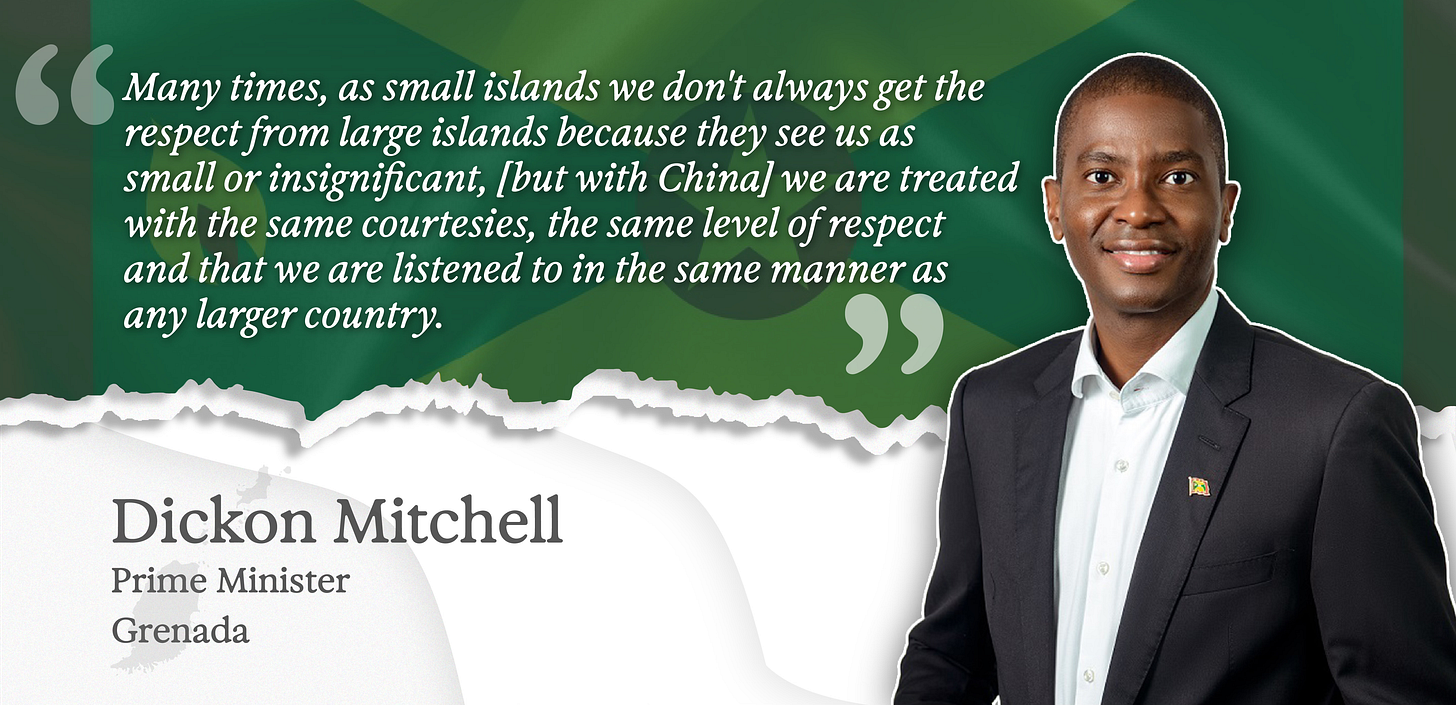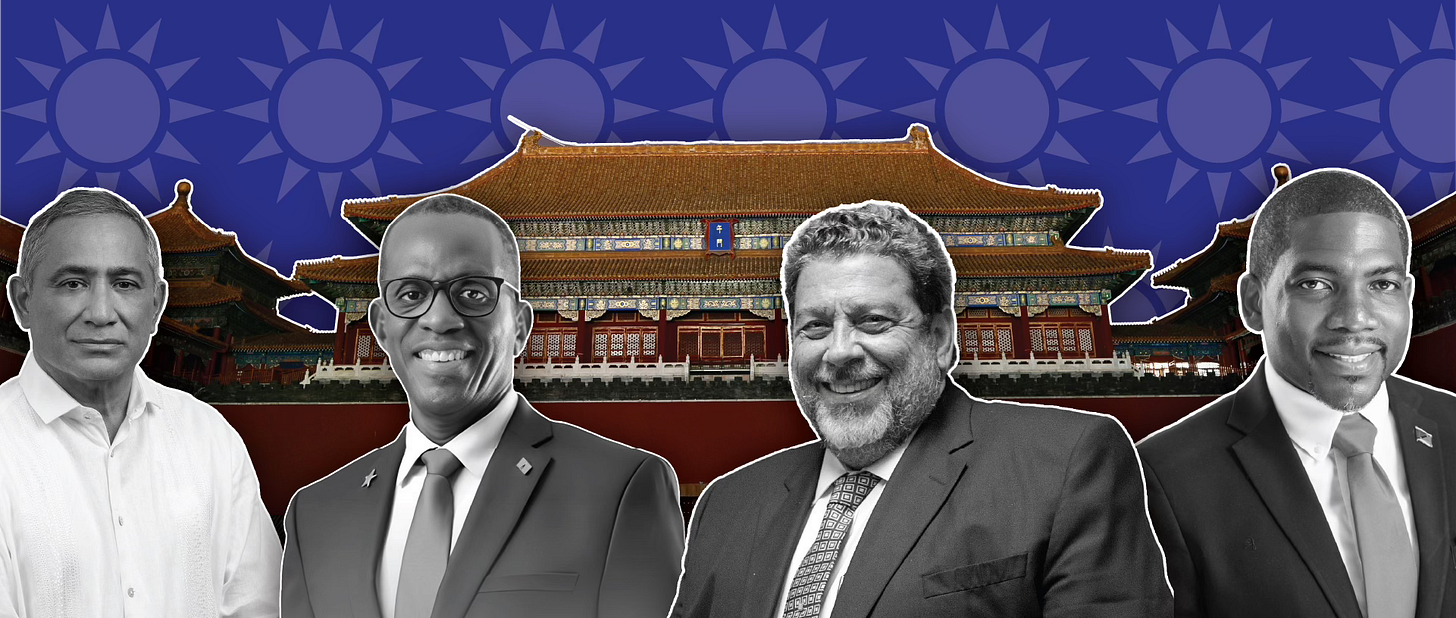Small Islands, Big Islands, Same Courtesies
Grenada's PM meets Xi in Beijing, Chinese officials at Maduro's inauguration, a new power plant in Panama, and a trade investigation into South American beef
Welcome to Chaufa, a China-Western Hemisphere Newsletter by CPSI.
Today’s edition covers December 31 to January 13.
Listen on Spotify
The Top 4 Stories:
The Prime Minister of Grenada, Dickon Mitchell, is visiting Beijing, Zhejiang, and Shanghai from January 11-17. The trip comes on the eve of the 20th anniversary of diplomatic relations. PM Mitchell met with President Xi, and is also expected to meet with Premier Li and the head of the PRC’s legislature. (CGTN) (CGTN)
Signifying the two sides’ deepening ties, Grenada’s Government Information Service (GIS) signed an MOU on new cooperation with Chinese state media outlet Xinhua.
This appears to be Dickon Mitchell’s first visit to the PRC since his election in 2022, though his predecessor Keith Mitchell traveled to Beijing in 2015.
As mentioned last edition, China’s Ministry of Commerce initiated a safeguard investigation into beef imports at the end of last year that could severely affect beef sales from Brazil, Argentina, and Uruguay. Recently in response, Brazil’s agriculture ministry said that it would work with its Chinese counterparts to show that its beef production is not negatively impacting the PRC’s industry. Similarly, Uruguay’s agriculture minister met with the Chinese ambassador and promised to provide as much technical information as possible to avoid new trade barriers.
Ironically, this trade investigation into the oversupply of a key commodity comes as countries across the hemisphere (and around the world) place trade barriers on Chinese manufactured exports over concerns of PRC “overcapacity.” Recently, governments ranging from Mexico to Brazil to Chile have put tariffs on Chinese goods to try to keep their domestic industries competitive.
A delegation led by Vice Chair of the National People's Congress Standing Committee, Wang Dongming, attended Nicolas Maduro’s inauguration in Venezuela. (Telesur)
With many Latin American and Caribbean countries refusing to recognize Venezuela’s fraudulent elections, China’s decision to send a high-level emissary to Maduro’s inauguration shows that Beijing plans to stand by the authoritarian regime.
That said, Wang isn’t the most notable official they could have sent — he’s a Central Committee member (the third highest body in the CCP). However, he ranks below Vice President Han Zheng’s (who will be attending Trump’s inauguration) previous position as a Politburo Standing Committee member, which is the highest decision-making body in the CCP.
Just as China-Panama relations have been in the news owing to U.S. President-elect Trump’s comments on the canal, PowerChina signed an agreement with Sajalices Energy to build a 530MW solar plant.
That said, the power plant will be built far from the canal, so this shouldn’t provide another excuse for the incoming Trump Administration to bully Panama over Chinese influence near the canal.
Core Brief
Does China really care that much about Taiwan’s few Caribbean diplomatic partners?
Almost exactly two decades ago, Grenada broke ties with Taipei in favor of Beijing. Prime Minister Mitchell’s recent visit to China for the 20th anniversary, as well as his comments that “there is only one China, and that speaks for itself,” serve as a reminder of this history.
Currently, there are still six Caribbean Basin countries (plus Paraguay) that still recognize the Taipei-based Republic of China (ROC)1 over the Beijing-based PRC. Though these countries routinely praise their friendship with Taiwan, PRC diplomats frequently try to convince governments (or sometimes just engage, with little to no convincing required) to instead recognize the Chinese Communist Party (CCP)-led government on the mainland.
The PRC government (especially its diplomats abroad) clearly cares about convincing the few LAC governments that host ROC embassies to replace them with PRC ones — just last month, a high-ranking Chinese foreign ministry official was kicked out of Paraguay for lobbying government officials. Relatedly, the Chinese foreign ministry has been on a recent kick of routinely calling on Guatemala to make the “right choice” to establish ties with the PRC.
But the news’ frequent discussion of a few Taipei-recognizing holdouts often obscures the issue’s real importance in the CCP’s Taiwan strategy. If convincing these countries to switch ties to the PRC was central to the CCP’s strategy to take over Taiwan, one would expect the CCP to explicitly tie their unification plans to eliminating the ROC’s formal relationships. Interestingly, this doesn’t seem to be the case.
Since the PRC’s and CCP’s officials and various offices are constantly publishing new statements on Taiwan, it’s difficult to find one comprehensive piece that articulates the PRC’s beliefs and strategy on the issue. Generally, the most authoritative documents for the CCP’s Taiwan policy are the three White Papers published in 1993, 2000, and 2022. Surprisingly, these papers barely explicitly condemn continued formal relations with the ROC.
Formal Ties in the White Papers
The closest the papers come to condemning formal ties with Taipei is when the 2022 paper stated “Taiwan has no right to represent China... nor can it establish diplomatic ties or enter into relations of an official nature with foreign countries.” But this wording condemns Taiwan and the broader situation, not the other countries themselves. Moreover, unlike much of the rest of the paper, the line doesn’t include a call to action for the few countries that recognize the ROC to change their ways.
Even the second white paper implicitly admitted that official relations with the ROC is not a major stumbling block in cross-Strait relations. When discussing the key foreign relations-related issues in the 1993 document, the 2000 paper identifies “relations between Taiwan and countries maintaining diplomatic ties with China, relations between international organizations... aviation services... and arms sales” as the four major areas of dispute.
What’s missing in this formulation? Formal relations between Taiwan and countries that do not maintain diplomatic ties with China.
Other Issues in the White Papers
So, what do the papers condemn instead?
All three papers extensively criticize Taiwan’s “pragmatic diplomacy” with countries that both recognize the PRC and host unofficial Taiwanese trade and cultural offices.2 The papers complain that this pragmatic diplomacy seeks to “create "two Chinas" or "one China, one Taiwan."
Given the focus on these kinds of “pragmatic” relationships with PRC-recognizing countries, the main targets of the papers’ ire are the United States and the ruling Democratic Progressive Party (DPP), as well as pro-Taiwan politicians like the late former President Lee Teng-hui.
All three papers extensively criticize Washington by claiming that the United States is promoting Taiwan's independence (the first paper spends four paragraphs griping about U.S. policy alone). The papers frequently criticize Taiwanese actors who have refused to abide by China’s formulation on One China. But unlike these actors, LAC countries with formal ties to Taipei are not cited as a major impediment to unifying Taiwan and the Chinese Mainland.
Why does this matter?
As the white papers make clear, concerns about the ROC’s remaining formal relations are more symbolic than anything else. Even more than symbolic military exercises or issuing ROC citizens PRC identification cards, winning over diplomatic partners is not central to the PRC’s cross-Strait strategy.
That said, because a symbolic win is still a kind of victory, lobbying Taipei’s diplomatic partners to switch ties will likely remain a favorite pastime of Chinese diplomats for the foreseeable future. But at least judging from some of the most important documents on the CCP’s cross-strait strategy, the CCP’s overall mission to unify the Chinese Mainland with Taiwan is not dependent on Taipei’s few remaining diplomatic partners.
And so, when LAC governments make the same choice that Grenada made 20 years ago to have an embassy in Beijing instead of Taipei, it’s important to recognize that the PRC is only leveraging the headlines about a new partner for symbolic pressure rather than a key step in taking over Taiwan.

The Roundup
Politics and diplomacy
Ecuador and China celebrated 45 years of relations this week, prompting Presidents Noboa and Xi to exchange messages of congratulations.
As Canada prepares to hold a general election, China’s embassy in Ottawa released a statement saying that it was looking to improve trade and political ties. Relatedly, SCMP published a piece on whether Canada will get closer to the PRC under a new leader.
The main opposition in Suriname, the National Democratic Party, “praised China for is support of the Desi Bouterse government,” after the local PRC embassy expressed condolences following the former leader’s death.
The scandal-ridden head of Peru’s legislature, Eduardo Salhuana, will travel to China in the coming days to meet with his parliamentary counterparts to discuss “international trade, port development, multimodal transport and tourism,” as well as to strengthen ties with Shanghai and Shenzhen.
Chinese Ambassador to the Bahamas Yan Jiarong met with Prime Minister Philip Davis to discuss her work since she landed on the island six months ago to “advance economic and trade cooperation, local cooperation, [and] people-to-people exchange.” (FMPRC)
Brazil assumed the BRICS group presidency on January 1, which will likely lead to President Xi returning to the country for the leader’s summit later this year.
Defense and security
New reporting finds that the Chinese government recently offered to sell Chengdu J-10 fighter jets to Brazil, but the South American government declined both because it was supposed to receive an order of fighters from Sweden and for what it claims were “financial issues.”
The Bolivian Navy hosted a high-altitude diving course at Lake Titicaca for 20 Chinese marines.
Investment, finance, and infrastructure
The PRC donated “69 tons of radiators, engines, parts and other accessories” to Cuba to help rehabilitate the country’s electrical grid. This is the second tranche of goods since 2024, and it will help rebuild 400MW of generation potential.
Chinese mining firm Zijin paused the construction of a lithium plant in Argentina owing to accusations of poor working conditions and unpaid debts (many of which were leveled in the fall of 2024), leaving 150 workers unemployed. However, the company plans to open the plant in 2025 and has promised to establish better working conditions.
Trade and Technology
A year and a half after negotiations started, the Chinese-Honduran FTA discussions have reportedly stagnated.
Peru’s intellectual property and trade office launched a dumping investigation into Chinese stainless steel car washes, which could result in significant tariffs on these Chinese imports.
Taiwan
Taiwan’s Ministry of Foreign Affairs donated $100,000 to Belize’s National Emergency Management Organization (NEMO) to help livestock producers affected by Tropical Storm Sara.
The Taiwanese embassy in St. Vincent donated toiletries, electronics, light hardware and protective gear to various local civil society and government entities. It also gave 29 agricultural tools and about 44,000 seedlings to local farmers.
Guatemala has a new ambassador to Taipei – Luis Raúl Estévez López, Guatemala’s former representative to the OAS. Estévez promised to enhance the 90-year-old relationship.
Society and culture
The University of the Andes in Colombia signed an agreement with the Hebei University of International Relations to facilitate exchanges and strengthen academic cooperation.
New Chinese-run stores that undercut their competition with low prices are hurting local businesses in Honduras. Chinese-run shops are expanding across the region, with a massive new Max Supermarket being built near Managua in Nicaragua.
Dominica PM Roosevelt Skerritt said that the PRC will donate about $100,000 to help rebuild the Arawak House of Culture’s roof. The building was damaged by Hurricane Maria in 2017.
Analysis and Opinion
With Trump’s threats of tariffs against Mexico in part over Chinese investment in the country, the New York Times published an article on PRC company’s circumvention of U.S. tariffs through Mexico. At the same time, the NYT reported on Mexican businesses planning to take advantage of reshoring owing to new U.S. tariffs on China.
Relatedly, the Economist has a piece on how Chinese firms are investing in Mexico to avoid U.S. tariffs, noting that “Mexico’s official FDI figures seem to undercount Chinese investment by a factor of six.”
The Diplomat published an article by Aparna Divya and Salman Ali that argues that “Brazil’s calculated approach to the Belt and Road Initiative reflects the unique nature of Latin American politics.”
José Luis Bernal has an op-ed in El Economista on U.S.-Mexico-China triangular relations, arguing that “new geopolitical conditions now force us to focus on how to promote trilateral communication.”
Writing in The Conversation, Jose Caballero argues that while “in 2025, [Latin American] countries with close ties with China could become targets for the Trump administration,” “China is certainly ready to build on its partnerships in the region if, and when, opportunities arise.”
The Atlantic Council published an article by U.S. Marine Corps Fellow Gregg Curley that “the US is right to be concerned about China’s influence over the Panama Canal.”
Looking to the China-LAC relationship in 2025, Daniel Salazar Castellanos writes in Bloomberg that “despite the challenges posed by a new Trump Administration for relations between China and Latin America, it is projected that 2025 could continue to be positive in trade between both markets.”That’s it for now, see you again in two weeks!
Make sure you don’t miss the next issue of Chaufa 👇
I’m being careful in my wording between the ROC and Taiwan in the piece, namely because no country actually recognizes a place called “Taiwan.” This is wrapped up in domestic Taiwanese politics, as well as what Taiwan Independence could actually mean in practice, but ultimately it informs why a country can’t maintain relations with the PRC and ROC.
I’ll talk about this more at another time, but I fear that this will eventually become the bigger issue in LAC. Its repeated reference should be flagged for countries like Brazil, Mexico, and Peru that still have unofficial ties with Taiwan. Though they likely already feel pressure on the issue from Beijing, this is only likely to intensify in the future.


